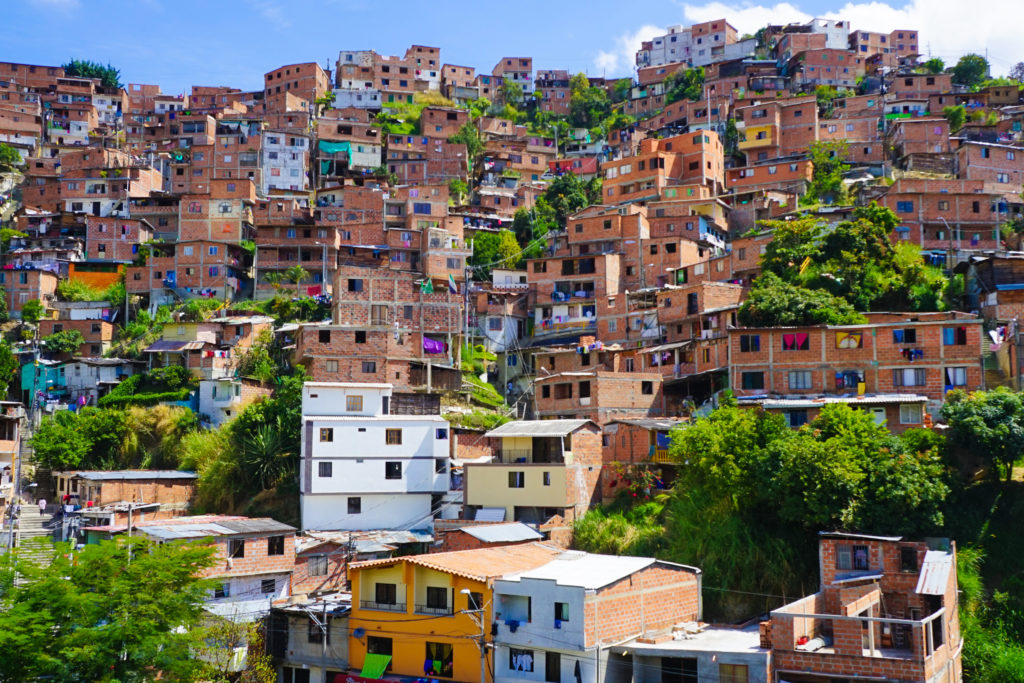Aled Rees talks about his time spent at the IMLR as an OWRI Visiting Fellow, December 2019 to February 2020.

During the mid-1980s, a unique heterogeneous urban language emerged from the shantytowns of the Colombian city of Medellín called parlache. Spoken primarily, although not exclusively, by the youngsters immersed in the criminal underworld brought about, in large part, by Pablo Escobar and the Medellín Cartel, parlache is a linguistic deviation of standard Spanish involving a revitalisation of antiquated Spanish; an imaginative “re-semanticisation” of existing Spanish lexicon; and in many instances, embraces a visual and metaphorical aesthetic which makes it largely inaccessible to members of the general population.
My fascination with parlache arose during my time working as a postdoctoral researcher on the Cross Language Dynamics: Reshaping Community (Translingual Strand) project based at Swansea University where I, alongside Professor Julian Preece, examined the various forms in which novelists incorporate and utilise multilingualism and translingualism in their writing. As a Visiting Fellow at the IMLR, I sought to complement and develop my previous research by investigating the representation of this sociolect in contemporary Colombian literature and the corresponding English language translations.
My first project at the IMLR was to expand on the existing scholarly discourse centred on parlache by extending the socio-linguistic perspective that this sociolect acts as a form of social protest against a dominant cultural order from which its speakers find themselves excluded. Using a theoretical framework rooted in Giles Deleuze and Felix Guattari’s theories of “minor literature” (1983), I analysed Jorge Franco Ramos’ Rosario Tijeras (1999) and Fernando Vallejo’s La virgen de los sicarios (1994) to address the ways in which these novelists have represented and utilised this ‘minor language’ in their fiction to not only emphasise the communitarian sense of belonging that this sociolect generates amongst its speakers (despite the frequent cases of gang warfare and the existence of diverging factions!), but also as a means of subverting traditional hegemonic practices. In order to carry out this research, I made extensive use of the Latin American Studies collection at Senate House Library in relation to the investigation of the historical role in which language has played within the Colombian nation, particularly with regards to its association with power and the ways in which it has acted as a means of exclusion.
Moreover, owing to the linguistically hybrid nature of parlache and its embracement of neologisms, archaisms, stylistic innovations and “re-semanticisations” or “revitalisations” of already existing Spanish lexicon, I was curious to discover the ways in which the translators of both Vallejo’s and Franco’s narratives have rendered such terminology in English. This would form the second part of my project. Drawing on Lawrence Venuti’s domestication vs foreignization dichotomy, I explored the translation strategies employed in the rendering of this sociolect to discover the extent to which this culturally and geographically embedded language was compromised in the transfer between source and target text.
In order to complement my research into this area, I organised for the event entitled ‘Latin America in Translation: Traversing Cultural and Linguistic Frontiers’ to take place on 25 March 2020. However, due to the unprecedented situation caused by the coronavirus pandemic, the event had to be postponed and will be rescheduled for a date later in the year. The event was to take the form of a roundtable conversation involving two widely acclaimed translators who are active in the field of literary translation – Nick Caistor and Cherilyn Elston – and had the aim of discussing the importance and complexities of translating diverse Latin American cultural and linguistic realities to an Anglophone readership. Particular attention was to be paid to both the idea of cultural interchange between divergent communities as well as the issues which arise in relation to the rendering of transcribed orality, dialect, colloquialisms, and geographically embedded phrases in the region’s fiction and nonfiction. As a mode of visibly demonstrating some of these issues, the translators had prepared brief presentations of excerpts of their own translations in order to offer an insight and explanation into their own method and decisions while translating. I look forward to rescheduling this event for some time in the autumn.
As the School of Advanced Study is home to several research institutes, I had the opportunity to attend events, presentations and seminars which were taking place. These included Dr. Nadia Mosquera’s (ILAS) talk on the Afro-Venezuelan population’s use of folklore as a means of political mobilisation and the IMLR’s seminar focused on discussing the contemporary culture of Brazilian cinematography and the difficulties it is currently facing. Additionally, I participated in the IMLR’s Brown Bag seminars in which members of the Institute – researchers, fellows and doctoral candidates – gathered to talk about their work and engage in encouraging and supportive discussions regarding possible current and future avenues of study.
My experience as a Visiting Fellow at the IMLR has been extremely positive not only in terms of the research I have been able to carry out using the extensive Hispanic, Latin American and theoretical resources available at Senate House Library, but also with regard to the opportunities to attend and participate in activities and events organised by the various institutes as well as the ability to engage with fellow researchers and academics based at the school. I will remember fondly my time at the IMLR and would recommend undertaking a fellowship there to everyone.
Dr Aled Rees, OWRI Visiting Fellow at the IMLR

How can you translate local dialects? Very tricky. Whatever you do you’ll end up imposing another identity on those who speak. So urban Colombians become Cockneys or Mancunians,for example. It will be interesting to hear what the translators did.